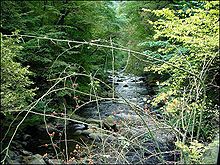River Bode
| Bode | |
|---|---|

The upper course of the Bode near Treseburg as it enters the Bode Gorge Nature Reserve
|
|

Das Flusssystem der Bode
|
|
| Country | Saxony-Anhalt in Germany |
| Basin features | |
| Main source |
Harz 860 metres (2,820 ft) |
| River mouth |
Saale 80 metres (260 ft) 51°50′27″N 11°46′17″E / 51.84083°N 11.77139°ECoordinates: 51°50′27″N 11°46′17″E / 51.84083°N 11.77139°E |
| Progression | Saale → Elbe → North Sea |
| Basin size | c. 3,000 km2 (1,200 sq mi) |
| Tributaries | |
| Physical characteristics | |
| Length | 169 kilometres (105 mi) |
| Discharge |
|
| Towns and villages | Quedlinburg, Oschersleben, Staßfurt, Thale, Wegeleben, Gröningen |
The Bode is a river in the German state of Saxony-Anhalt, a left tributary of the Saale. It rises in the Harz mountains and drains them in a northerly direction. After 169 kilometres (105 mi) it discharges into the Saale at Nienburg. The river is named after a legendary giant, the wild, rampaging, Bohemian, Prince Bodo, who, according to the Rosstrappe legend changed into a marauding dog that guarded the crown of Princess Brunhilde in the Kronensumpf ("crown marsh") in the present-day Bode Gorge (German: Bodetal). The gorge is the narrow section of the Bode valley between Treseburg and Thale.
According to tradition, there was once a giant called Bodo who came from Thuringia to pursue Brunhilde, the king's beautiful daughter, whom he wanted to marry against her will. Brunhilde fled on a white stallion (Ross), but they suddenly came to a deep ravine. With one bold leap she reached the rocks on the far side, but her pursuer fell into the abyss. The hoofprint of her horse can still be seen today as the so-called Rosstrappe. Meanwhile, Bodo was turned into a dog. As her horse leapt the gorge, however, the princess lost her golden crown, which was now guarded by the dog Bodo in the valley of the river. The river was given the name Bode after the giant Bodo who was now under a spell.
The Bode is heavily divided in its source region on the Brocken, the highest peak in the Harz, but its two most important source streams are the:
The two rivers, which actually have a temperature difference of 2 °C, merge not far from the Königsburg Ruins immediately before flowing into the Königshütte Dam (a feeder dam or Überleitungssperre).
...
Wikipedia
